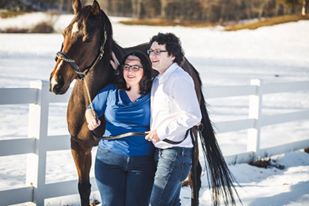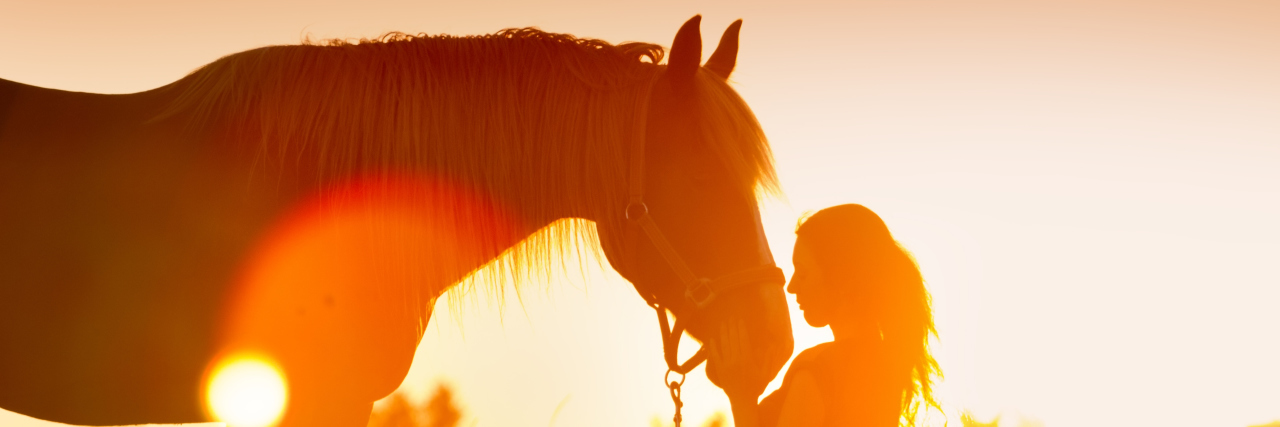I gave up on being a veterinarian after I failed calculus for the third time.
My childhood was colored by a neurological problem called NVLD, which is a little like autism, except with worse depth perception. It makes spatial skills like reading a map and doing fractions difficult for me, and it made calculus an insurmountable challenge. I’d wanted to be a vet for as long as I could remember though, and I’d convinced myself I could if I just tried hard enough. Having my dream ripped away from me reeked of a failure I could not fix.
By the time I met Blues in January 2014, I’d given up hope of making much of myself. A close friend had bought him, sight unseen, as a three-day eventing prospect. His sales ad said he was around 15.2 hands tall, quiet, and restarted under saddle. The horse that showed up was four inches taller than advertised, pitifully skinny, caked in mud, had toes a mile long, and badly needed his teeth done. He had a sour attitude and a bucking problem, and no interest at all in working together with people.
There was something about this horse that struck me. I found myself finding excuses to go to the barn to hang out with Blues. I didn’t know why. I wasn’t looking for a horse, especially not that one, because he was dangerous and out of my league. I’d dabbled in riding in high school, but I was several years removed from that. Still, I couldn’t help but smile as he slowly learned to crunch peppermints from between my fingers.
My friend did what she could. She fixed him up and got his teeth and feet sorted, then taught him how to lunge and how to lead nicely. But no amount of training would stop him from launching anyone that got on his back within a few minutes. She quickly decided he would never be suitable for her goal of three-day eventing and sought to move him on to someone more capable of dealing with his challenges. I was heartbroken.
That Christmas, I unwrapped a stall plate with his name on it. My then-fiance had taken the plunge and purchased him. I cried, partially out of relief, and partially because I knew it was a foolish decision for a novice horse owner like me to have a difficult horse like him.
He was still green as spring grass. He was still difficult to lunge and danced in the crossties like he was covered in fire ants. I had no idea how to teach a horse to do anything, let alone stop bucking, but I wanted to try anyway. I didn’t want to give up on him. More importantly, I needed to prove to myself I was still good at something, even if it was something I’d never done before and didn’t have a prayer of doing correctly.
I tried every technique I could think of to get Blues to stop bucking. I had a lameness exam done, which he passed with flying colors. I lunged him in a million gadgets. I worked him in the round pen using natural horsemanship techniques. I rode him on lead, off lead, and in between. I employed a trainer, who told me I was wasting my time and that he was too much for me. I tried massage, acupuncture, chiropractic, stretching, and every supplement at the local Smartpak store that had a label that sounded promising.
None of it made him feel better. He’d quickly quieted down into a lamb on the end of a lead, but still transformed into a dragon under saddle. I grew more and more frustrated with his shortcomings by the day.
I couldn’t bear to send him away though, even after other people told me it was wise, or that he would hurt me, or that neither of us would ever be happy if I couldn’t ride him. I couldn’t put my finger on why, but the thought of getting rid of him was so painful that I couldn’t think about it for more than a few minutes. So I kept telling myself we’d just try again later, even though later never came. I ignored the niggling thought in the back of my mind that maybe the vet had missed something, that may be he was acting out because he couldn’t stand it and not because I was incompetent. I convinced myself it was just wishful thinking and that if I tried hard enough, I would succeed.

Sometime that August, I walked into Blues’ stall to find his leg swollen four times its normal size and non weight bearing. Panic gripped me like a vise. The vet was quick to give a diagnosis: cellulitis. It could be fatal if it wasn’t treated, so I had him trucked off to the clinic to spend a week there under their watchful eyes. This is where I first heard the words “kissing spine,” mentioned in passing by a tech who had lunged him as part of his recovery.
The X-ray machine they wheeled in the next day held the answers. The diagnosis was definitive: kissing spine. All his spinal processes touched, causing blinding pain when downward pressure was applied to his back, like the pressure of someone trying to sit in a saddle. Too severe for surgery, if he would even tolerate it. My orders were to keep him comfortable and never attempt to ride him again.
I want to say I was heartbroken when I learned, because everyone told me I should be. Horses were for riding, weren’t they? Instead, I remembered an entire childhood of teachers telling me I wouldn’t amount to much. I remembered the school psychologist telling my mother I likely wouldn’t graduate high school because my spatial skills were so poor. I remember an army of other parents asking my mom if she really expected her daughter to ever have any friends.
I was crushed with guilt for trying to make Blues be a veterinarian when he couldn’t do calculus.
After I quit my pre-vet program, I enrolled in another college and got an IT degree. I wasn’t sure it was something I wanted, but it was something I could do. It turns out I’m fantastic at it. I graduated magna cum laude and have had a successful career since. I have a wonderful husband, own my own home, and have a wonderful group of supportive friends who only think I’m a little bit weird.
If I had focused solely on my calculus grade, I would have seen only failure. I’d concentrated so hard on what Blues couldn’t do that I’d missed all the things he could. He knew exactly where to put his head when I was on the verge of a panic attack. After I got in an accident, he knew how to stand so I could put my arm over his huge shoulders and use him for support. We found solace in walks in the woods together and in sharing apples on warm summer days. And all that time we were learning about each other, until I wasn’t sure another horse could ever replace him.
In some ways, Blues and I are similar. You wouldn’t know there is anything different about either of us if you saw us on the street, or in the pasture. You might not even notice if you talked to one of us up close. Unlike me though, Blues does not know he is disabled. As far as he’s aware he’s just another horse. He is perfectly capable of eating grass, running around, farting, and crunching peppermints from between my fingers. His life is filled with grooming sessions and neck scratches and walks in the woods. He didn’t listen when humans told him he wouldn’t amount to much because he can’t be ridden; he doesn’t care.
Perhaps if I had been more like him, my early 20s would have been a lot less fraught. I hinged my entire life on being a veterinarian without considering what it would mean if I did not succeed. I’d convinced myself that if I couldn’t do even one thing, that meant I was a failure. It meant all those people who had told me so were right, and I would never amount to much. It meant I had not tried hard enough to overcome my own disability.
Too often we can’t see the forest from the trees. Too often we look at an animal — or a person — with a disability and only see what they can’t do. Some people with NVLD can’t drive, live by themselves, or manage money. Too many people would say that means they are useless and not worth much, like they said about Blues. No one should have to meet an arbitrary checklist in order to be worthy of respect and agency over their own destiny. We are still worthy, even if there are some things we’ll never be able to do.
I have another horse now that I can ride, but no horse will ever replace what Blues is to me. The bond we’ve built through spending time together — without the pressure of riding — is deeper and more complete than the bond I’ve had with any other animal. Occasionally someone will tell me what a good person I am for keeping him. How kind and lovely my heart must be to keep such a useless animal! I used to try to disabuse them of that notion. Nowadays I don’t bother, because they don’t know, and they never will. And I don’t have anything to prove to them, either.
Getty image by Callipso.

